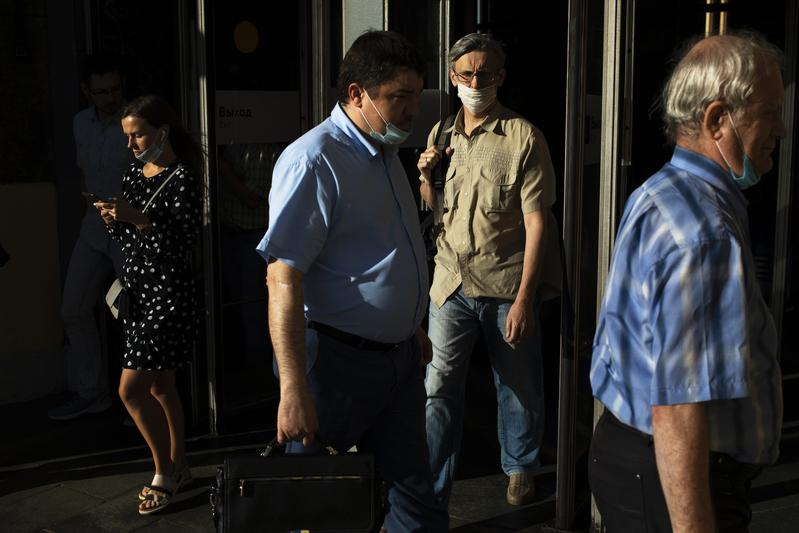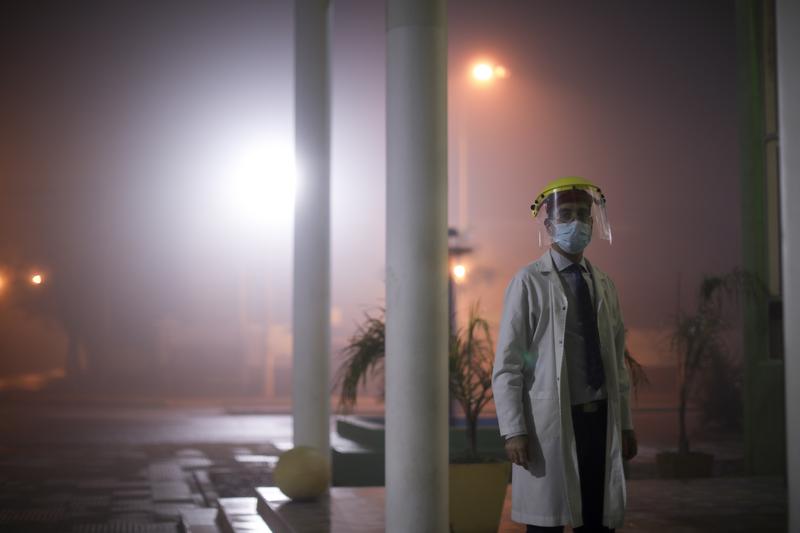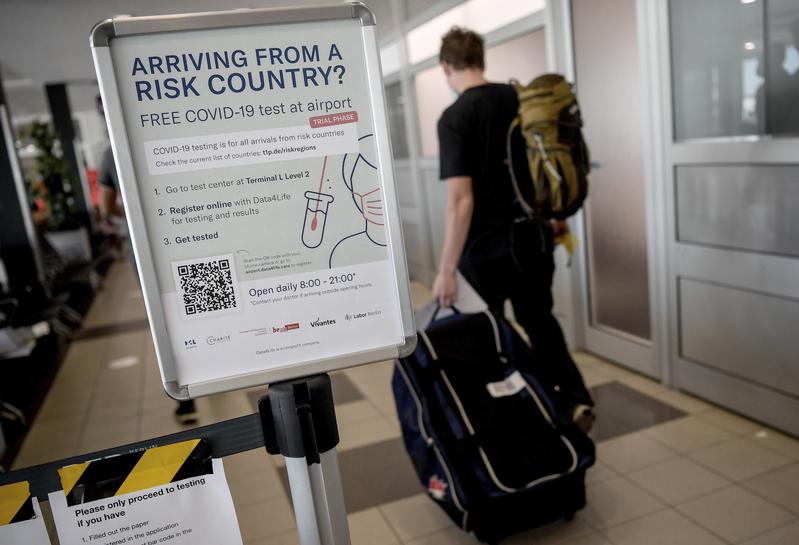 People wearing face masks to protect against coronavirus leave a subway station in Moscow, Russia, July 30, 2020. (PAVEL GOLOVKIN / AP)
People wearing face masks to protect against coronavirus leave a subway station in Moscow, Russia, July 30, 2020. (PAVEL GOLOVKIN / AP)
PARIS / WARSAW / ATHENS / BUENOS AIRES / WINDHOEK / BERLIN / LONDON / DUBLIN / MOSCOW / CAIRO / ADDIS ABABA / NICOSIA - Russia’s health minister is preparing a mass vaccination campaign against the novel coronavirus for October, local news agencies reported on Saturday, after a vaccine completed clinical trials.
Health Minister Mikhail Murashko said the Gamaleya Institute, a state research facility in Moscow, had completed clinical trials of the vaccine and paperwork is being prepared to register it, Interfax news agency reported.
He said doctors and teachers would be the first to be vaccinated.
On Saturday, Russia reported 95 additional deaths from the novel coronavirus, taking its total to 14,058.
Officials reported 5,462 new cases, raising the total to 845,443.
More than 100 possible vaccines are being developed around the world to try to stop the COVID-19 pandemic.
At least four are in final Phase III human trials, according to World Health Organization (WHO) data, including three developed in China and another in Britain.
 Nuns wearing protective masks walk along a street in Queretaro, Mexico on July 21, 2020. (PHOTO / BLOOMBERG)
Nuns wearing protective masks walk along a street in Queretaro, Mexico on July 21, 2020. (PHOTO / BLOOMBERG)
Mexico
Mexico has overtaken the UK to become the country with the third-most deaths due to COVID-19, according to data released by the Health Ministry Friday night. Reported fatalities rose 688 from Thursday to reach 46,688, the data show.
The number of cases rose by a daily record of 8,458 to 424,637. The UK has 46,204 deaths, according to data compiled by Johns Hopkins University.
The high death rate in Mexico indicates actual cases may be much higher. In Brazil, which is No 2 behind the US with the most number of cases and deaths, the fatality rate is about twice that of Mexico, while cases are about six times higher.
Mexico has been criticized for its lack of testing, leaving officials without information about the illness’s spread. Deputy Health Minister Hugo Lopez-Gatell, who’s leading the country’s response on the virus, has acknowledged that while actual cases are much higher than official counts, the Health Ministry’s testing strategy is effective in tracking outbreaks.
As Mexico increasingly becomes a hotspot, President Andres Manuel Lopez Obrador has largely focused on reactivating the economy over enacting strict lockdowns. He’s also downplayed the importance of using masks to slow the virus’s spread. In remarks July 25, he acknowledged the pandemic has hit the country hard and led to many deaths. He attributed the toll to the prevalence of chronic diseases such as high blood pressure and diabetes.
Even so, the president maintained the spread of the virus is slowing.
“There are signs coronavirus infections are decreasing and fortunately, even though there have been deaths and it’s something that’s very painful, no one in Mexico has been left without medical attention,” Lopez Obrador said. “Hospitals haven’t been saturated because we’re alert. We’re addressing the problem in a timely and responsible way.”
US
Two major drug companies will supply the US government with 100 million doses of an experimental coronavirus vaccine, the Trump administration said on Friday, as the nation’s top health agency predicted that fatalities would rise in the coming weeks.
The agreement calls for the US government to pay French drug maker Sanofi and British pharmaceutical giant GlaxoSmithKline up to US$2.1 billion to supply it with enough vaccines for 50 million people, with the option to buy another 500 million doses.
The purchase falls under the Trump administration’s so-called Operation Warp Speed, intended to rush a COVID-19 vaccine to the market by the end of 2020.
The coronavirus has infected 4.5 million people in the US and killed more than 152,000 Americans, according to a Reuters tally.
The US Centers for Disease Control on Friday forecast between 168,000 and 182,000 total fatalities by August 22, predicting that deaths will rise fastest in Alabama, Kentucky, New Jersey, Puerto Rico, Tennessee and Washington state.
The CDC also released a study that said COVID-19 had spread to nearly half the staff and campers at a sleep-away camp in Georgia over a week and a half ago.
The investigation demonstrated “that children of all ages are susceptible to SARS-CoV-2 infection and, contrary to early reports, might play an important role in transmission.”
 Dr Matias Norte stands outside a hospital during a government-ordered lockdown to curb the spread of the new coronavirus in Buenos Aires, Argentina, July 18, 2020. (NATACHA PISARENKO / AP)
Dr Matias Norte stands outside a hospital during a government-ordered lockdown to curb the spread of the new coronavirus in Buenos Aires, Argentina, July 18, 2020. (NATACHA PISARENKO / AP)
Argentina
Argentina will extend a mandatory lockdown until Aug. 16 as its coronavirus cases continue to rise, President Alberto Fernandez announced on Friday.
The lockdown, which has been the strictest in the capital Buenos Aires, was due to expire on Sunday.
The South American nation has seen its caseload spike in recent weeks and recorded a record daily tally on Thursday with 6,377 new cases. There are now 185,373 confirmed cases and 3,466 deaths, according to the latest government data.
Argentina has been under lockdown since March 20, though restrictions were previously relaxed in many parts of the country.
On July 17, Fernandez announced a plan for the country to gradually return to normal life in several stages. Outdoor recreation was permitted and shops, hair salons and some professional services re-opened earlier in Buenos Aires earlier in the month. The capital has one of the highest concentration of new cases, along with the province of Buenos Aires.
Most office buildings and restaurant dining rooms remain closed and public transportation is restricted for those without government permission.
Cyprus
Cyprus re-introduced tough measures to contain a new surge of the coronavirus infections, including wearing masks in all indoor public places, Health Minister Constantinos Ioannou announced on Friday.
After the meeting chaired by President Nicos Anastasiades, which approved the measures, Ioannou told a press conference that the additional restrictions were considered necessary to check a fresh outbreak of COVID-19 cases centered in the southern city of Limassol.
The minister said that those who failed to observed the rules liable to a fine of 300 euros.
President Anastasiades warned that failure in respecting the measures will lead to stricter ones with serious financial repercussions.
Egypt
Egypt reported 321 new COVID-19 infections on Friday, the health ministry said, the lowest figure since May 3.
In total, 94,078 COVID-19 cases have been reported in Egypt, of which 39,638 have recovered and 4,188 have died, including 31 on Friday, the ministry said in a statement late on Friday.
Egypt reopened resorts to foreign tourists on July 1 after tourism came to a halt in March under measures to curb the coronavirus outbreak.
But Egypt has not yet made it to a “safe list” of countries for resumption of non-essential travel to the European Union.
Tourism accounts for 5 percent of Egypt’s economic output, according to the government. The figure rises to as much as 15 percent if jobs indirectly related to the sector are included, analysts say.
Ethiopia
Ethiopia's confirmed COVID-19 cases reached 17,530 after 915 new COVID-19 positive cases were confirmed on Friday, the Ethiopian Ministry of Health said.
This is so far the highest daily increase in the Horn of Africa country.
The Ethiopian Ministry of Health, in a statement issued on Friday, revealed that from a total of 8,957 medical tests that were conducted within the last 24 hours, some 915 of them tested positive for COVID-19, eventually bringing the total number of positive cases to 17,530.
Eleven more patients succumbed to illnesses related to the COVID-19 pandemic, bringing the total number of COVID-19 related deaths in the East African country to 274, according to the ministry.
The ministry further said 6,950 patients who tested positive for COVID-19 had so far recovered, including 187 in the last 24 hours period.
ALSO READ: France to make wearing masks in public spaces mandatory
France
France reported 1,346 new coronavirus infections on Friday, taking the total to 187,919 as the daily tally of new cases remained above 1,300 for the third day running, a level last seen during lockdown.
France’s busiest airport was on Friday preparing to start testing passengers for COVID-19 on arrival from high-risk countries, a move that could reduce the need for quarantine measures causing pain to the tourism industry across Europe.
Anyone landing from one of 12 countries identified by the French government will be required to visit the testers. One worker will record their contact details, then direct them to a colleague who will insert a swab into their nasal passage to gather a sample for testing.
Travellers are then allowed to continue their journey. Test results will come through between 24 and 48 hours later, when travellers will be contacted by public health workers.
At the end of the first month of school holidays, with millions of French people traveling and mingling with friends and family not seen for weeks, the infection rate has risen back to a level last reported in late April, when the epidemic was in full swing and a strict lockdown was in place.
Comparisons can be difficult, as the health ministry does not publish data every day and it sometimes adds batches of historical data to single-day figures. But the seven-day moving average (7DMA), which smoothes out such irregularities, is now above 1,000 for the second day in a row.
Except for early May, when the 7DMA was above 1,000 for a week due to a data revision, the 7DMA was above 1,000 from March 19 to May 1, with a peak of 4,5537 on April 1.
On Friday, the government gave local authorities the power to order the wearing of face masks in outdoor public spaces as the country fights a resurgence of COVID-19.
But while new infections are now back to lockdown and pre-lockdown levels, fewer people are dying or falling seriously ill compared to a few months ago.
The health ministry said on Friday the number of people in hospital with COVID-19 fell by 77 to 5,298, continuing an uninterrupted fall from a peak of 32,292 on April 14.
The number of patients in intensive care also continued to fall, down by 10 to 371 and compared to a high of 7,148 on April 8.
In the past 24 hours, 11 people died from the virus, taking the total to 30,265.
In April, France had several days with more than 1,000 virus deaths, with a peak of 1,438 on April 15.
Finland
Finland became the first country in the Nordics to allow public gatherings of over 500 people, indoors as well as outdoors, starting Saturday. The government also dropped its recommendation that people work from home.
 A traveler passes a new corona test station at the 'Schoenefeld' airport in Berlin, Germany, July 31, 2020. The first travellers returning from high-risk areas have been tested for the corona virus. (BRITTA PEDERSEN / DPA VIA AP)
A traveler passes a new corona test station at the 'Schoenefeld' airport in Berlin, Germany, July 31, 2020. The first travellers returning from high-risk areas have been tested for the corona virus. (BRITTA PEDERSEN / DPA VIA AP)
Germany
The number of confirmed coronavirus cases in Germany increased by 955 to 209,653, data from the Robert Koch Institute (RKI) for infectious diseases showed on Friday.
The reported death toll rose by 7 to 9148, the tally showed.
Germany’s foreign ministry advised the public on Friday against unnecessary tourist trips to the northern Spanish regions of Catalonia, Navarre and Aragon, as concerns grow that travel could bring a second wave of COVID-19 infections.
The Robert Koch Institute, a German public health agency, put the three Spanish regions on its list of high risk locations, meaning people returning to Germany are required either to quarantine for 14 days or present a negative coronavirus test.
With virus numbers ticking up in Germany, fears have grown that tourists returning from destinations experiencing a surge in new cases could spread infection quickly. Germany reported 870 confirmed coronavirus cases on Friday, the highest daily total since mid-May.
From next week, Germany plans to make coronavirus tests mandatory at airports for all returning holidaymakers from high-risk areas in order to slow the spread of infections.
Germany’s travel warning follows moves by other European countries to restrict travel from Spain, above all Britain, which accounts for the largest share of foreign visitors. It has introduced a 14-day quarantine on all arrivals from Spain and recommended against all but essential travel to the Spanish mainland. Norway has also imposed a 10-day quarantine.
France has advised against travel to Catalonia.
Greece
Greece will make mask-wearing compulsory in all indoor public spaces and also in outdoor spaces where proper social distancing cannot be observed, its deputy civil protection minister said on Friday, following a further rise in COVID-19 infections.
Greece reported 78 new confirmed cases of COVID-19 infections on Friday, its highest tally in about two months. Overall, it has so far confirmed 4,447 COVID-19 cases with 202 deaths, a relatively low number compared to many European countries, after imposing an early lockdown in the spring.
Health authorities made mask-wearing compulsory for consumers at supermarkets 10 days ago and on Tuesday moved to extend the measure to more indoor public spaces to contain the spread of the novel coronavirus.
Masks are already mandatory on public transport.
Authorities will prohibit visits to care facilities for the elderly and to hospitals until mid-August. They will also set a limit of 100 people attending weddings, funerals and baptisms.
Other restrictions to go into effect next month will allow no standing clients in bars, night clubs and live music establishments and will ban open air festivities until the end of August.
Namibia
Namibian schools will be suspended for the second time in four months next week, while limits on public gatherings will be tightened further to 100 from 250 amid surging cases, President Hage Geingob said.
In a televised speech on Friday, Geingob said the decision to suspend schools from Aug. 4 for 28 days came after considering the risks associated with the spread of the virus.
The measure affects early childhood development, pre-primary, primary and the first two grades of high school.
Namibia has 2,129 confirmed cases and 10 deaths with the country’s rate of daily new cases now the fourth highest on the continent following South Africa, Eswatini and Gabon, according to Geingob.
People will also not be allowed to consume alcohol at bars and taverns. They will only be permitted to drink it at home.
Geingob relaxed rules for international tourists, who will no longer be subjected to a mandatory 14-day quarantine on arrival but will be required to present a negative polymerase chain reaction (PCR) test conducted 72 hours before arrival.
They will, however, be required to remain at their initial destination in the country for seven days. A test will be conducted during this period and tourists can proceed with their holiday if the result is negative.
Poland
The Polish government will consider new restrictions for certain parts of Poland with the most new coronavirus cases, a government official said on Friday, after the number of new cases rose by a record amount for the second successive day.
The Health Ministry reported 657 new cases and seven deaths, taking the total number of cases since the pandemic began to 45,688 and the death toll to 1,716.
Poland has reported fewer cases of COVID-19 than some other European countries, but the number of new infections is now climbing. While a crisis meeting was held on Friday, no new immediate measures were announced.
Of the new cases, 227 were in the Silesia region, where there has been an outbreak among coal miners.
Muller also said that restrictions would unlikely be nationwide and that the government would explore imposing quarantine measures on travellers from certain countries also facing a rapid growth in new cases.
Switzerland
Switzerland ordered the closure of nightclubs in Geneva until Aug 23 and increased restrictions on bars and restaurants following a 40 percent increase in Covid-19 cases in the canton. Customers in bars and restaurants must remain seated while they are consuming food or beverages and wear a mask when not seated, according to a notice published late Friday.
READ MORE: After 'warning light', UK PM halts virus lockdown unwind
UK
People in England will be required to wear face masks or other face coverings in cinemas, places of worship, museums and art galleries from Aug 8, Prime Minister Boris Johnson said on Friday.
Face coverings are already required on public transport and, more recently, in shops.
Northern Ireland on Friday launched the United Kingdom’s first COVID-19 tracing app, and the first one that can also trace users in another country, Ireland, who have been in contact with someone suffering from the disease.
The developer NearForm, which hopes the app will become a blueprint eventually synching up all of Europe, launched a similar app in Ireland on July 8, and cases can now be traced across the island’s open border by two separate health services.


